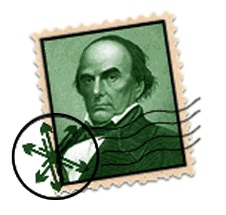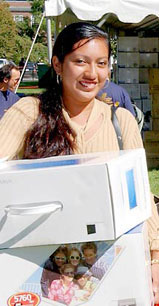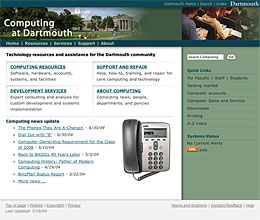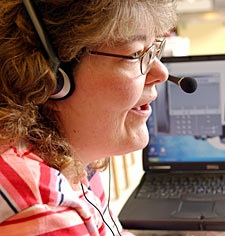The 2000s
< Previous
2000
Farewell to Kiewit
A "Farewell to Kiewit" ceremony was held. The ceremony marked a milestone transition: the widespread use of computing at Dartmouth in the first era to the move of the Kiewit functions to the new Berry Library in the next era. The demolition of the old Kiewit building helped make room for Carson Hall. Demolition of Kiewit Began
The demolition of the Kiewit Computation Center began with the removal of asbetos and lead paint. The demolition was expected to be done by Thanksgiving. Kiewit was razed to make room for Carson Hall. Library for the 21st Century Opened
In September, the new Berry Library opened. It is a $55.5-million, 121,000-square-foot addition to Baker Library. The Library was funded in part by the late John W. Berry '44, the principal donor with $27.5 million; his son, George Berry '66; the Loren M. Berry Foundation, established by John Berry's father; and George F. Baker III, whose great-grandfather funded the construction of Baker Library in 1926. See Dartmouth College Library. Institute for Security Technologies Studies FoundedThe Institute for Security Technology Studies (ISTS) at Dartmouth College was founded. It was dedicated to pursuing research and education for cyber security and trust. ISTS strengthens homeland security through interdisciplinary research, education, and outreach programs that focus on technology critical for cyber security and trust. ISTS nurtures leaders and scholars, educates students and the community, and collaborates with its partners to deploy technology to benefit our community and to better understand technology's impact on our security. ISTS research improves our ability to design secure computer systems and protect them from attacks, enables people and organizations to form secure trust relationships across networked computing devices, and addresses social, economic, and policy issues that arise in the development and deployment of such technology. |
2001
Dartmouth Goes Wireless
Dartmouth College became the first Ivy League school to offer wireless Internet access on campus. "Dartmouth was the first totally wired university, and now it will be the first totally wireless university," said Ted Cooley, director of information technology at Dartmouth's Thayer School of Engineering. Library's Web-based Catalog Went Live
The Dartmouth College Library went to a web-based catalog. "The catalog provides a more streamlined interface for our users," says Cyndy Pawlek, Associate Librarian, "but at the same time, it provides powerful linking capabilities both to related information within the catalog, and to other online resources on the Web. The new system was designed to meet established standards in the marketplace, which enabled us to exchange information and integrate with other systems more easily." Noblet Named New Director for Technical Services
Brad Noblet was named Dartmouth's new director of computing technical services, He was responsible for Dartmouth's data, telephone, and cable TV networks, central Machine Room operations, and software development. Video Producers Won Second Gold Medal
Dartmouth video producers Michael Murray and Michael Sacca were awarded a gold medal in the 2001 CASE Circle of Excellence Awards program for their videotape on the World Percussion Music Ensemble - Return to the Well. The eight-minute piece was cited for its wonderful use of natural sound and dramatic portrayal of the passion of students and faculty who comprised the group. |
2002
Public Printing System Revamped
The public printing system at Dartmouth was revamped to help control waste and improve satisfaction for both students and print window workers. The new system, called GreenPrint, was based on one that was used at Princeton. Dartmouth Won $1.6 Million Mellon Grant for PKI Research
A Dartmouth team of computing researchers was awarded a $1.6 million grant that enabled them to develop applications that would revolutionize the way colleges and universities conducted academic business. Public keys are a method of cyber-encryption often used by the e-commerce industry. The team developed more secure and effective systems for university-based PKI. It was designed to make it easier to identify and authorize people who wanted to use network resources. Professor Capitalized on Wireless Technology
Dartmouth Professor G. Christian Jernstedt taught a psychology course where his students eagerly participated. In addition to lively discussions, the sound of tapping PDAs (Personal Digital Assistants), connected by the wireless network, were prevalent. Jernstedt and his students were taking part in an experiment in learning. It contributed to his ongoing research on how to better understand how people learn and what educational methods worked best. Mac-to-Windows Migration
Dartmouth's administrative departments started migrating to a Microsoft platform in order to support Windows-based information systems. |
2003
O'Leary Named New Administrative Computing Director
Robert O'Leary was named the new Director of Administrative Computing for Computing Services. His challenge is to refine, standardize, and prioritize all administrative computing systems to better meet the needs of all users of administrative systems throughout Dartmouth, so that offices and departments can operate as efficiently as possible in support of the academic enterprise. Web Publishing Services Established
GreenPrint Quotas Enabled
The College enabled a quota system for GreenPrint, the campus printing system for academic work. Each term, students are provided with an allocation of free black-and-white printing. Faculty and staff can continue to use the black-and-white printers with no quotas. Administrative staff can no longer use this system. Virus Detection Software Installed
Computing Services installed virus detection software on the server that controls e-mail going to and from off-campus addresses. The software scans files attached to e-mail messages for possible viruses. Class of 2007 Cut the Cord
More than 97 percent of the incoming students who bought pre-configured computers through Dartmouth opted for wireless-enabled laptops that take advantage of the ubiquitous network environment. The wireless network became available in the spring of 2001.
New Computing Web Site Debuted
The first phase of the updated Computing Services Web site debuted, following in-depth governance, architecture, and production work by Computing staff. The first phase featured a new site architecture, new graphics, and approximately 300 web pages, including software downloads and Dartmouth-specific how-to documents converted to html format. See Computing at Dartmouth. Network Upgrade 75 Percent Done
Seventy-five percent of an upgrade to the campus data network was completed, bringing improved performance and a foundation for new services to the Dartmouth community. The network upgrade is capable of supporting telephone traffic over the data network (called Voice over IP or VoIP), virtual LANs, and virtual private networks (VPNs).
Dartmouth Stopped Billing for Phone Calls
Dartmouth stopped billing for phone calls originating on its network. What made the change possible was simple economics. Dartmouth couldn't afford to bill for phone calls any more. Long-distance rates had plunged, call volumes had dropped, and billing for phone calls cost money. |
2004
Dartmouth's Wireless Network Recognized by EDUCAUSEDartmouth's wireless computing initiatives were recognized by EDUCAUSE, a nonprofit association dedicated to advancing higher education by promoting the intelligent use of information technology. Dartmouth won the award for excellence in Networking: Innovation in Network Technology, Services, and Management.
Dartmouth Ranked Tops for Tech-SavvyKaplan/Newsweek America's Hottest Colleges edition ranked Dartmouth College as the "Hottest for the Tech-Savvy." The citation refers to the pioneering work of Professors John Kemeny and Thomas Kurtz. Dartmouth Converted Telephone/Computer/Video Networks Into OneDartmouth converted the College's telephone and computer — and, eventually, video — networks into one. The conversion to "Voice over Internet Protocol," or VoIP, for faculty and staff with 646 numbers translated to more services, expanded mobility, and increased flexibility. Media Production Group Won Gold MedalThe Media Production team within Peter Kiewit Computing Services was awarded a gold medal from the Council for Advancement and Support of Education (CASE). This award was for the production of "When Dartmouth Builds." The video explored the values and philosophy behind Dartmouth's building program. New Center Opened to Support Student Academic WorkThe Student Center for Research, Writing, and Information Technology (RWIT) opened in Berry Library in the fall of 2003. This integrated training facility helps students determine their research topics, locate resources, structure and compose theses, use multimedia technology as video editing applications and PowerPoint presentations, and trains them in a variety of other project/composition-polishing techniques. See RWiT. Blackboard Course-management System Extended the ClassroomThe campus-wide use of the Blackboard course-management system expanded quickly, after growing slowly its first three years. The Blackboard Web site is considered an extension of the classroom. See Blackboard at Dartmouth. Noblet Named Networking Role ModelComputing Services' Brad Noblet kept good company. In an issue of Network World (NW), he shared the stage with Cisco president and CEO John Chambers, Hewlett-Packard's chair and CEO Carly Fiorina, and Microsoft czar Bill Gates. All made NW's selective list of the "50 most powerful people in networking." Noblet was singled out for the pioneering work he did instituting wireless networking on the Dartmouth's campus.
New and Improve Computing at Dartmouth Web Site LaunchedA new and improved Computing at Dartmouth Web site was launched, the result of collaboration and a year's worth of effort by several teams. The goal was to take existing Web sites that covered computing issues on campus and integrate them into one. See Computing at Dartmouth. |
2005
Dartmouth Conference Supported World Usability DayDartmouth participated in World Usability Day, a global series of events organized by The Usability Professionals Association to promote ease of use in design. Over 50 conferences and seminars took place on six continents, including Dartmouth's World Usability Day New England. Computing Services Unveiled New Online Calendar SystemHelp was on the way for students who struggled balancing busy social lives and packed schedules. Peter Kiewit Computing Services rolled out Oracle Calendar, a free, web-based version of the calendar program used by Dartmouth faculty and staff since 2000. Rice University and Dartmouth Collaborated on Emergency Web SiteRice University and Dartmouth College Collaborated on an Emergency Web Site in Anticipation of Hurricane Rita. Rice University asked Dartmouth if they could host an emergency Web site if Rice's data center closed because of Hurricane Rita. The site was intended to be a temporary public communication vehicle. In the case of extreme devastation, Rice would activate an alternative data center, where Web operations would recommence. Classroom Technology Services Provided State-of-the-Art ClassroomsThere was a time when the average classroom was equipped with desks, chairs, a chalkboard, and little else. Not anymore. Today's classroom is an interactive tool in the learning/teaching experience. At Dartmouth, that means sophisticated digital projection, design that allows those projected images to be viewed from nearly anywhere in the room, and easy reconfiguration for small-group exercises. Dartmouth Tightened Up Network AccessComputer security breaches at colleges and universities throughout the country, including Dartmouth, have spurred campus network administrators to tighten up the log-on procedures for its 10,000 users. With an open-access, campus-wide wireless network and as many as 20,000 active IP addresses that identify network users, a simple password is no longer sufficient to keep digital intruders at bay. See Safe Computing at Dartmouth. Levine Named Chief Information Officer for Harvard Arts and SciencesLarry Levine became Chief Information Officer and Associate Dean for Information Technology for the Harvard Faculty of Arts and Sciences (FAS). Levine was the Chief Information Officer and Associate Provost for Information Technology at Dartmouth, where he led Peter Kiewit Computing Services since 1991. He oversaw academic, administrative, and network IT initiatives that served the entire institution. Protecting Yourself Against Cyberspace Attacks Becomes a ChallengeIn an era characterized by easy access to all kinds of information, protecting private information became an escalating challenge, especially for institutions that store a range of sensitive data. For Dartmouth, the biggest threats came from outside the College. To meet those challenges, Peter Kiewit Computing Services developed a multi-layered strategy. I3P Launched a $3 Million Research ProgramThe Institute for Information Infrastructure Protection (I3P) at Dartmouth College launched a $3 million research program to help quantify the costs of cyber attacks and measure the effectiveness of current security tools and policies. Phones, Televisions, and Computers Converged at DartmouthIn 2001, Dartmouth embarked on a computing journey that started with the deployment of an enormous one-mile square wireless network. It was part of an institutional vision for a computer network infrastructure that would someday combine voice, television, and Internet. "Convergence" was achieved as the College switched its cable and satellite television system to the network. This follows the 2004 migration of the traditional telephone system to VoIP, or Voice-over Internet Protocol.
Dartmouth Switched to New Search EngineAlthough the switch was probably invisible to most visitors to the dartmouth.edu Web site, a new search engine facilitated exploration around the College's virtual home. A committee convened by Computing Services incorporated feedback from users in designing an improved way to search Dartmouth's presence on the Web. |
2006
Waite-Franzen Appointed Vice President for Information TechnologyEllen J. Waite-Franzen, the Vice President for Computing and Information Services at Brown University, was named Vice President for Information Technology at Dartmouth. Waite-Franzen leads Dartmouth's computing services, which encompasses all computing infrastructure and architecture, applications development, and instructional and research support. Computing Services Begins Holding Open HousesComputing Services began to hold open houses. These open houses are intended to provide the Computing Services directors with an opportunity to update the community on activities within the IT environment at the College, and also to provide an opportunity for members of the Dartmouth community to ask questions and raise issues. |
2007
Dartmouth Held World Usability Day New England 2007 ConferenceFor the third consecutive year, Dartmouth College and Landmark College jointly organized World Usability Day New England 2007. The theme was “universal usability to enhance learning, effectiveness, and understanding across people of all abilities.” This year’s conference offered two tracks, one on Teaching & Learning and the other on Web Usability. Both tracks explored ways in which a universal usability methodology could be used to design classrooms, curricula, instructional technology, library services and resources, and Web sites that are usable by all. Securing the eCampus 2.0: Building a Culture of Information Security in An Academic Institution Conference HeldThe Securing the eCampus 2.0 conference was held to discuss the unique challenges of cyber security in academia and what it takes to build a culture of security at an institution. Recent trends illustrate that information system security is both a campus-wide concern and a institution-wide responsibility. New Secured Wireless Network Becomes AvailableDartmouth's single wireless network was divided into four separate services to meet the needs of distinct groups of users, and also better safeguard Dartmouth's information. The four new wireless networks (SSIDs) are Dartmouth Security, Dartmouth Wireless Portal, Dartmouth Library Public, and Dartmouth Public. Students Won Google's Campus 3D Contest by Building a Virtual DartmouthA team of Dartmouth students won Google's Build Your Campus in 3D Competition. Google asked "how would your campus look in 3D" and challenged students to use Google SketchUp and Google Earth software to find out. The Dartmouth group was one of seven winning teams chosen from more than 350 entries. Dartmouth Feted Its Computing History-making Student "Sysprogs"The 1960s and 1970s were a feverish era in Dartmouth computing, a period that saw the creation and implementation of software and systems that made Dartmouth a leader in academic computing and brought computing out of the realm of experts and into everyday life. See The Dartmouth Computing Timeline. Dartmouth hosted a one-day reunion for the former undergraduate "sysprogs" — short for "system programmers." New Director of Administrative Computing AppointedEllen Waite-Franzen, Vice President for Information Technology at Dartmouth, announced the appointment of Joseph (Joe) Doucet, the Director of the Enterprise Computing Group at the University of New Hampshire, as the next Director of Administrative Computing. Updated Mission Statement for Peter Kiewit Computing ServicesEllen Waite-Franzen, Vice President for Information Technology and Chief Information Officer, unveiled an updated mission statement for the Peter Kiewit Computing Services organization. The statement was developed over six months in a process involving Computing Services staff. Dartmouth Student Won 2007 Computer Security Awareness Video ContestEvan Michals, 07, a Dartmouth Student and an employee of the Student Computing Help Desk, won the silver award in the 2007 Computer Security Awareness video contest conducted by the Security Task Force in the 30-second public service category.
Computing, Research, and Teaching Web Site CreatedCREATE, a new Web site created by Academic Computing, highlights the use of computing technologies to support research and teaching at Dartmouth. Information technology generates excitement when used in ways that are innovative. The real story about academic computing is less about hardware and software, and more about the creative ways faculty, students, and researchers use it to accomplish the mission of the institution. See CREATE: Computing, Research, and Teaching. Conference Held to Address Growing Security Concerns Facing Critical InfrastructuresMore than 60 leading researchers from around the world convened on Dartmouth's campus for an intense conference to address growing security concerns facing critical infrastructures, notably the electronic communications networks and physical systems on which most nations depend. |
< Previous

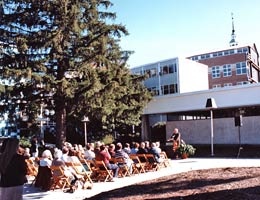

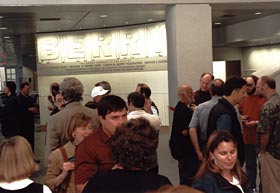
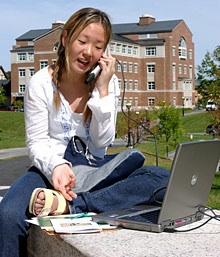

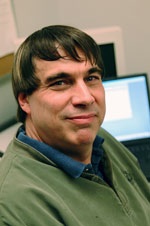
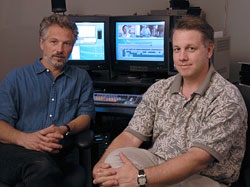
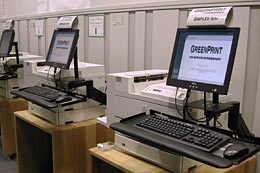
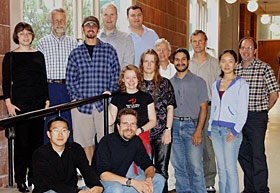
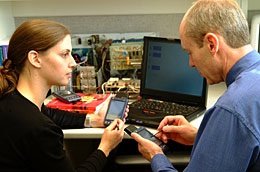
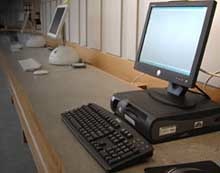
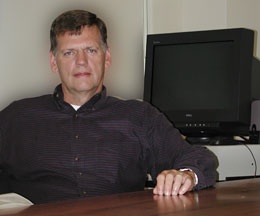
 The
reorganization of Computing Services' Web support group brought new attention
to Dartmouth's Web presence. The Web Publishing Services (WebPub) group
supports Dartmouth's non-curricular Web publishing needs, as well as Computing
Services' public communications. See
The
reorganization of Computing Services' Web support group brought new attention
to Dartmouth's Web presence. The Web Publishing Services (WebPub) group
supports Dartmouth's non-curricular Web publishing needs, as well as Computing
Services' public communications. See 
